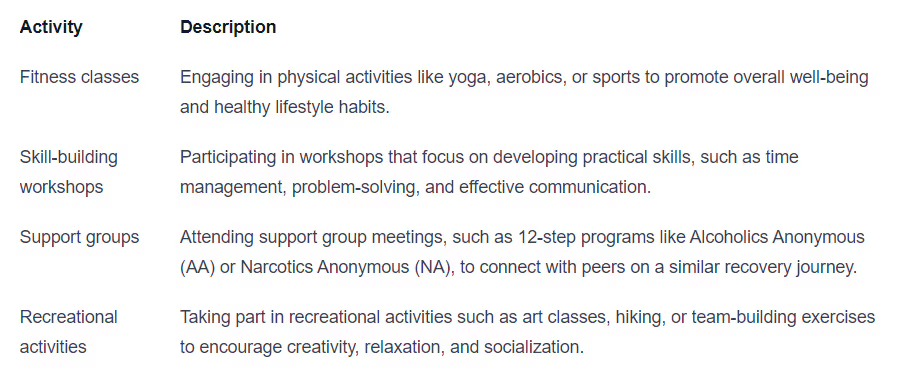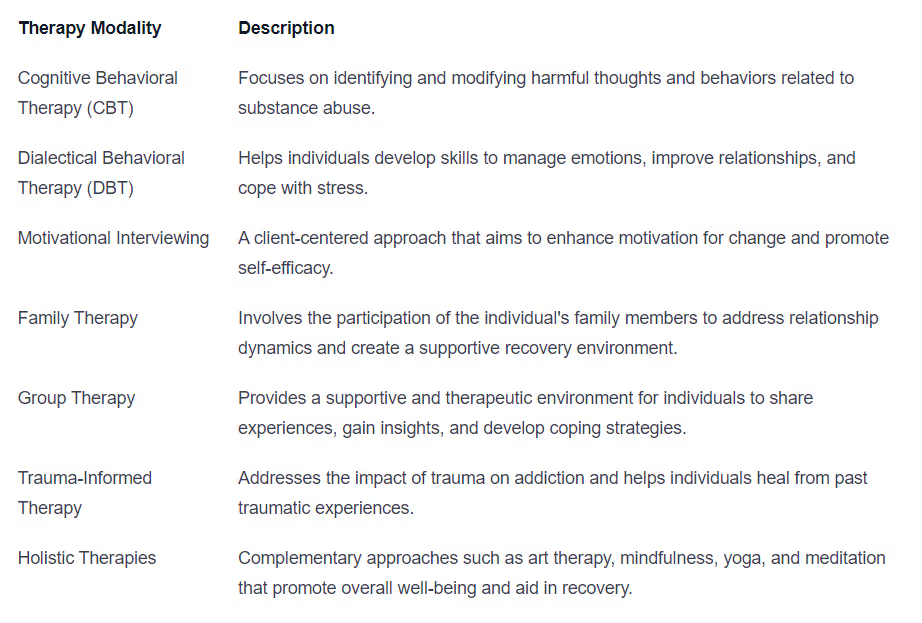What is a Typical Day in Drug Rehab Like?

Understanding Drug Rehab
When it comes to overcoming drug addiction, drug rehab plays a vital role in providing individuals with the necessary tools, support, and guidance to achieve lasting recovery. Let's delve into what drug rehab entails and why it is so important in the journey towards sobriety.
What is Drug Rehab?
Drug rehab, short for drug rehabilitation, refers to the process of assisting individuals in overcoming substance abuse and addiction. It involves a comprehensive approach that addresses the physical, mental, and emotional aspects of addiction. The primary goal of drug rehab is to help individuals achieve and maintain a drug-free lifestyle.
Drug rehab can take place in various settings, such as residential treatment centers, outpatient clinics, or hospital-based programs. The specific program chosen depends on the individual's needs, the severity of their addiction, and other factors.
During drug rehab, individuals receive a range of evidence-based treatments and therapies tailored to their unique circumstances. These treatments may include individual counseling, group therapy, family therapy, medication-assisted treatment, and holistic approaches.
The Importance of Drug Rehab
Drug rehab is essential for several reasons. Firstly, it provides a safe and supportive environment for individuals to detoxify from drugs and manage withdrawal symptoms. Medically supervised detoxification helps to ensure the safety and comfort of the individual during this challenging phase.
Additionally, drug rehab offers a structured and therapeutic setting where individuals can address the underlying causes of their addiction. It provides them with the tools and coping mechanisms to navigate cravings, triggers, and high-risk situations. Through therapy and counseling, individuals can gain insight into the psychological and emotional factors contributing to their addiction.
Moreover, drug rehab promotes personal growth and self-discovery. It helps individuals develop essential life skills, improve communication and interpersonal relationships, and cultivate healthier coping strategies. By acquiring these skills, individuals are better equipped to maintain long-term sobriety and lead fulfilling lives.
The table below highlights some key reasons why drug rehab is crucial in the recovery process:
Importance of Drug Rehab
Provides a safe environment for detoxification
Addresses the underlying causes of addiction
Equips individuals with coping mechanisms and life skills
Promotes personal growth and self-discovery
Reduces the risk of relapse
In conclusion, drug rehab is a crucial component of the recovery journey for individuals struggling with drug addiction. By offering comprehensive treatment, therapy, and support, drug rehab helps individuals break free from the grips of addiction and embark on a path of lasting sobriety.
Structure of a Typical Day in Drug Rehab
When it comes to drug rehab, a structured routine plays a vital role in facilitating recovery and providing individuals with the necessary tools to overcome addiction. Understanding the typical day-to-day activities in drug rehab can give insight into the comprehensive treatment approach that is followed. Let's take a closer look at the structure of a typical day in drug rehab, which includes a morning routine, therapy sessions, and group activities.
Morning Routine
A typical day in drug rehab often begins with a structured morning routine. This routine helps establish a sense of stability and discipline, which are crucial aspects of the recovery process. The specific activities in the morning routine may vary depending on the rehab facility, but they usually include:
- Wake-up time: Participants are expected to wake up at a designated time to start their day.
- Personal hygiene: Engaging in daily self-care activities such as brushing teeth, showering, and getting dressed.
- Breakfast: A nutritious breakfast is provided to ensure individuals start their day with a balanced meal.
- Medication management: For individuals requiring medication as part of their treatment, this is often administered under the supervision of medical staff.
Therapy Sessions
Therapy sessions are a core component of drug rehab programs. These sessions aim to address the underlying causes of addiction, provide coping strategies, and foster personal growth. A typical day in drug rehab includes various therapy sessions, which may include:
- Individual therapy: One-on-one sessions with a therapist or counselor to explore personal issues, set goals, and work on specific challenges.
- Group therapy: Group therapy sessions provide individuals with the opportunity to share experiences, receive support, and learn from others facing similar struggles.
- Behavioral therapy: Evidence-based behavioral therapies, such as cognitive-behavioral therapy (CBT) or dialectical behavior therapy (DBT), are commonly used to help individuals develop healthier coping mechanisms and address negative thought patterns.
- Specialty therapy: Some rehab programs offer specialized therapy sessions, such as art therapy, music therapy, or equine therapy. These alternative therapies can provide unique avenues for expression and self-discovery.
Group Activities
Group activities are an integral part of drug rehab programs as they promote social interaction, build a sense of community, and foster personal growth. These activities often aim to develop essential life skills, improve communication, and provide recreational outlets. Typical group activities may include:

The structure of a typical day in drug rehab provides individuals with a comprehensive treatment approach that addresses their physical, emotional, and psychological needs. This structured routine, along with therapy sessions and group activities, creates an environment conducive to recovery and supports individuals in their journey towards a drug-free life.
Individualized Treatment Plans
In drug rehab, one of the key aspects of successful recovery is the implementation of individualized treatment plans. Recognizing that each person's journey is unique, drug rehab centers tailor their treatment approaches to meet the specific needs of each individual.
Tailoring Treatment to Each Individual
A crucial element of drug rehab is the customization of treatment plans to address the specific challenges and circumstances faced by each person. By taking into account factors such as the type and severity of addiction, co-occurring mental health disorders, and personal goals, treatment professionals can create a comprehensive plan that maximizes the chances of successful recovery.
Individualized treatment plans typically involve a combination of evidence-based therapies, counseling, and holistic approaches. These plans are designed to address not only the physical addiction but also the underlying emotional, psychological, and social factors that contribute to substance abuse.
Therapy Modalities Used in Drug Rehab
To provide comprehensive care, drug rehab centers employ a variety of therapy modalities as part of their individualized treatment plans. These modalities are chosen based on their effectiveness in addressing addiction and facilitating recovery. Some common therapy modalities used in drug rehab include:

By utilizing a combination of these therapy modalities, drug rehab centers aim to provide a well-rounded treatment experience that addresses the diverse needs of individuals seeking recovery.
Individualized treatment plans are crucial in drug rehab as they recognize the unique nature of each person's journey and tailor the approach accordingly. By combining personalized treatment with evidence-based therapies and supportive services, drug rehab centers strive to provide individuals with the tools and support they need to overcome addiction and achieve lasting recovery.
Supportive Services
In drug rehab, individuals receive comprehensive support to address their physical, mental, and emotional needs. This section explores the various supportive services available in drug rehab programs, including medical and psychiatric care, holistic approaches, and aftercare planning.
Medical and Psychiatric Care
Drug rehab programs prioritize the well-being of individuals by providing access to medical and psychiatric care. These services are essential for addressing any physical or mental health issues that may have arisen due to substance abuse.
In drug rehab, medical professionals conduct thorough assessments to identify any underlying health conditions and develop appropriate treatment plans. This may involve medical interventions, medication management, and monitoring of vital signs.
Psychiatric care plays a crucial role in addressing the emotional and mental health aspects of substance abuse. Through therapy and counseling, individuals can explore the root causes of their addiction, manage co-occurring mental health disorders, and develop healthy coping mechanisms.
Holistic Approaches
To support individuals on their journey to recovery, many drug rehab programs incorporate holistic approaches into their treatment plans. These approaches recognize the interconnectedness of the mind, body, and spirit, and aim to promote overall well-being.
Holistic therapies may include practices such as yoga, meditation, art therapy, and mindfulness exercises. These techniques help individuals reduce stress, manage cravings, improve self-awareness, and develop a sense of inner peace. By addressing the whole person, holistic approaches can enhance the effectiveness of traditional therapy methods.
Aftercare Planning
Preparing individuals for life after drug rehab is a crucial aspect of the recovery process. Aftercare planning involves developing a comprehensive strategy to support individuals once they complete their inpatient or outpatient program.
Aftercare plans are tailored to each individual's specific needs and may include ongoing therapy, support groups, and relapse prevention strategies. These plans also focus on helping individuals reintegrate into their communities, rebuild relationships, and establish a healthy and fulfilling lifestyle.
By providing continued support and guidance, aftercare planning aims to minimize the risk of relapse and promote long-term recovery.
Supportive services in drug rehab programs are designed to address the complex needs of individuals struggling with substance abuse. Through medical and psychiatric care, holistic approaches, and aftercare planning, individuals receive the necessary support to overcome addiction and build a foundation for a healthier future.
Breaking Barriers to Recovery
Recovery from drug addiction is a journey that involves breaking down barriers and overcoming challenges. In drug rehab, individuals are provided with the necessary tools and support to navigate these obstacles and build a foundation for lasting recovery. This section explores some of the key aspects of breaking barriers in the recovery process.
Overcoming Stigma
One of the significant barriers individuals face when seeking drug rehab is the stigma associated with addiction. Stigma can create fear, shame, and discrimination, making it difficult for individuals to seek help and openly discuss their struggles. However, drug rehab programs strive to create a safe and non-judgmental environment where individuals can feel supported and understood.
By promoting education and awareness, rehab centers work to combat the stigmatization of addiction. They emphasize that addiction is a treatable condition and that seeking help is a sign of strength, not weakness. Through counseling, group therapy, and peer support, individuals in drug rehab are encouraged to challenge the negative beliefs and self-perceptions associated with addiction, ultimately fostering self-acceptance and empowerment.
Addressing Relapse Prevention
Another crucial aspect of breaking barriers in drug rehab is addressing relapse prevention. Relapse is a common concern for individuals in recovery, and drug rehab programs aim to equip individuals with the necessary skills and strategies to prevent relapse and maintain long-term sobriety.
In drug rehab, individuals receive comprehensive relapse prevention education and training. They learn about the triggers and risk factors that can lead to relapse and develop coping mechanisms to manage cravings and urges. Through individual therapy and support groups, individuals explore their personal relapse warning signs and develop personalized relapse prevention plans to effectively navigate challenging situations.
Success Stories and Testimonials
Success stories and testimonials play a vital role in breaking barriers to recovery. Hearing about the experiences of individuals who have successfully completed drug rehab and achieved lasting sobriety can provide hope, inspiration, and motivation to those currently in treatment.
Rehab centers often share success stories and testimonials through various mediums, such as brochures, websites, and videos. These stories highlight the transformative journey of recovery, showcasing the positive impact drug rehab can have on individuals' lives. By sharing these stories, rehab centers aim to reduce stigma, encourage individuals to seek help, and demonstrate that recovery is possible.
In addition to success stories, testimonials from individuals who have completed drug rehab programs can provide valuable insights into the effectiveness and quality of the treatment. These testimonials offer firsthand accounts of the support, guidance, and resources provided in rehab, giving others a glimpse into what a typical day in drug rehab might be like.
Breaking barriers to recovery involves addressing stigma, focusing on relapse prevention, and sharing stories of hope and resilience. Drug rehab programs strive to create an inclusive and supportive environment where individuals can overcome these barriers and embark on a path of lasting recovery.
Conclusion
Drug rehab programs provide individuals struggling with addiction a structured environment that addresses their physical, emotional, and psychological needs. Through individualized treatment plans, therapy sessions, group activities, and supportive services such as medical and psychiatric care, holistic approaches and aftercare planning, drug rehab centers aim to facilitate long-term recovery.
While the journey to recovery may involve breaking down barriers and overcoming challenges such as stigma and relapse prevention, success stories of individuals who have successfully completed drug rehab programs offer hope and inspiration for those currently in treatment.
In conclusion, drug rehab programs play a crucial role in addressing addiction by providing individuals with the necessary tools, support, and guidance to achieve lasting sobriety. Through a comprehensive approach that recognizes each person's unique journey towards recovery, drug rehab centers offer a path towards healing and a brighter future.
Sources:
- https://www.drugabuse.gov/publications/drugs-brains-behavior-science-addiction/treatment-recovery
- https://www.samhsa.gov/find-help/recovery
- https://www.addictioncenter.com/rehab-questions/drug-rehab/
- https://www.psychologytoday.com/us/therapy-types/evidence-based-practices
- https://www.verywellmind.com/what-is-dialectical-behavior-therapy-1067402
